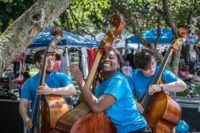by Alice Koeninger

MHI Faculty, assistants, and students alike were demarcated by periwinkle-colored shirts with the Institute logo in yellow. Director Peter Dominguez wore a blue blazer over his t-shirt as he welcomed everyone, commenting on the “incredible diversity of styles” that would be showcased, and that characterize the world of double bass.
The first half of the concert consisted of short performances by each ensemble, almost like a tasting of what these musicians had learned. Faculty member Sam Suggs’ group, consisting of Conservatory students who are also MHI alumni and assistants (Zoe Heuser, Eli Naragon, and Gavin vanWinkle-Bright) began the evening with a work from the Renaissance era. Suggs played along, mostly just to accent, and then was replaced by Gervis Myles, also an assistant and Conservatory student, for the second piece –– Suggs’ own arrangement of an Oscar Pettiford tune. One could imagine that these musicians were so busy helping the younger students during the week that they didn’t have much time to rehearse.
Ann Gilbert lead her young ensemble in six short songs, each well-known melodies like the “Jeopardy” theme and “The Hokey Pokey” that were played steadily and musically. At one point, Gilbert, who was playing, angled her bass towards one of her students to make sure he was bowing correctly, giving a glimpse into how the coaching MHI ensemble might operate.
David Murray, who was emceeing the show, mentioned that this was the first time many of these students were playing chamber music, which might have accounted for some unsteady rhythms. Dominguez’s ensemble was next, playing a jazz tune. All three (Kieran Choi, Jonathan Jacques, and Giana Formica), plucked a repeating rhythm with a jazzy swing. The tune featured a small solo by Formica, who appeared to be the leader, and another one by Choi. They were all very enthusiastic about their music, and cheekily turned their basses around for the fade-out, ending with their backs facing the audience.
Murray’s ensemble (Bryan Young, Raeleigh Vincent, Raaghav Lele, and Samantha St. John) was next, playing a Celtic lament arranged by Rachel McAndrews, and the “Bourée” from Handel’s Water Music. They played with vibrato, and were poised and pretty. Mimi Jones and her ensemble (Joseph Wagner, Riley Keller, and Scott Stover) came onstage for an edgier piece, G.W. They took their time with the subdued melody, adding texture by plucking thick notes throughout. Alvin Batiste’s jazzy Carrie Mae was well-executed, with solos from Wagner, Keller, and Stover, and with a frizzante flourish by Jones herself.
Diana Gannett’s ensemble (Jane Hanneman, Maxwell Moses, Jacqueline Marshall, and Henry Peyrebrune), played Stravinsky’s “Infernal Dance” from The Firebird with beauty and balance, taking a cute bow together at the end. Max Dimoff’s group (Aaron Lawton, Brendan Goodbred, Alex Haldane, and Joshua Gebhard) played Barber’s Adagio for Strings and the second movement from Mahler’s First Symphony melodiously and brightly. Small nods exchanged between the boys indicated their confidence in their abilities.
Though Ben Williams had left for Europe the day before, his ensemble (Mason Kano, Neal Perrine, and Ian Ashby) represented him well, with a pleasant and purposeful performance of Williams’ arrangement of In the Summertime.. Their second piece was jazzier, with funky undertones and good intonation. Tracy Rowell’s students ended the ensemble part of the concert with a light version of Joplin’s The Entertainer and an appropriately-placed Gute Nacht.
After a short intermission, all the basses, including the musicians who were there to learn to teach the Suzuki method, gathered onstage to form an orchestra, physically embodying the community they had formed during their time at the Institute. Conducted by Audrey Melzer, they began with John Clayton Jr.’s Our Father, Our Judge, written by Clayton for Hinton’s 90th birthday and performed by all the people who were taught by Milt and who loved him. The piece was short and sweet, a crescendo of emotion. John Kennedy conducted the other three works, beginning with Celia Cruz’s Yerbero Moderno arranged by Ben Ferris, which was bright and dance-like. Borodin’s Polovetzian Dance, arranged by Kennedy himself, was more somber and ironically less dance-like than its predecessor, with a rich beauty like the night.
The concert concluded with a performance of “Found/Tonight,” a combination of two songs from the musicals Dear Evan Hansen and Hamilton, arranged by Kennedy and Alex Lacramoire. The partnership between Lin Manuel Miranda, Benj Pasek, and Justin Paul was formed in D.C. during the “March for Our Lives” to protest gun violence. Kennedy dedicated the song to all the friends he’d made that week. The emotional piece began with part of “The Story of Tonight,” from Hamilton, and transitioned smoothly into the chorus of “You Will be Found.” Kennedy encouraged the orchestra to bring the melody through, for a bittersweet end to the evening.
Published on ClevelandClassical.com July 18, 2018.
Click here for a printable copy of this article



